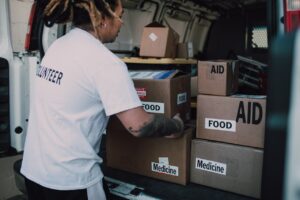For the EU, volunteering is an expression of active citizenship, a learning path and an essential activity for the development of democratic values, human dignity and equality.
Volunteering can also help you in finding your next job opportunity and the EU has created different tools to help you in the process!
Participation in a volunteering project is a significant achievement for any young person. It is an opportunity for developing social and personal competences and gaining valuable professional experience, contributing to working in multicultural teams, solving creative problems, using a foreign language in managing everyday tasks, living independently in another European country and much more.
These experiences help the participants with their personal growth, as well as with finding opportunities for their future careers and learning paths.
Volunteering experiences: a strong added value when looking for a job
If you have taken part in a volunteering experience, at the local or international level, always make sure to reflect upon the learning that came out of it. Employers usually appreciate such experiences.
During an interview and on your CV, it’s always good to have the capacity to explain the learning outcomes of a volunteering experience. Employers especially value transversal skills such as adaptability, autonomy, reliability, creativity, sense of initiative. How did you develop those skills and many others, during your volunteering experience?
As you would do for a work experience, it’s important to be able to detail the missions carried out, the skills and knowledge acquired. If you can connect those skills to the requirements of the job advert, even better!
Volunteering: a work experience in your Europass CV
The EU has created a free online tool for you to create a Curriculum Vitae that is used across Europe and that takes into account your lifelong learning experiences, the Europass CV. This tool can support you in building a dynamic career and in recognising your competences, professional and transversal.
According to Europass, volunteering activities, paid or unpaid placements or traineeships should be described in the “Work Experience” section of your CV. You can also add the competences acquired during a volunteering experience under the “Personal Skills” section.
Besides, for volunteering experiences abroad, the Europass CV can be complemented by a Europass-Mobility annex. This document has to be filled in by the institution that sent you abroad.
Recognition of volunteering: the European Solidarity Corps and Erasmus+
The Youthpass Certificate is available to all Erasmus+ Youth and European Solidarity Corps participants in all project formats. Since its launch in 2007, over 1 million Youthpass certificates have been issued to participants!
The purpose is to enable participants to better present and communicate the learning outcomes they have acquired during their participation in the programmes. It also contributes to raise awareness and recognise the results of young people’s learning and their participation in EU youth programmes.
Youthpass should be understood as a process, it is a constant reflection that helps to monitor the participants’ learning. Organisations that use the Youthpass Certificate endeavour to improve the quality and visibility of their work and to recognise non-formal and informal learning across Europe.


